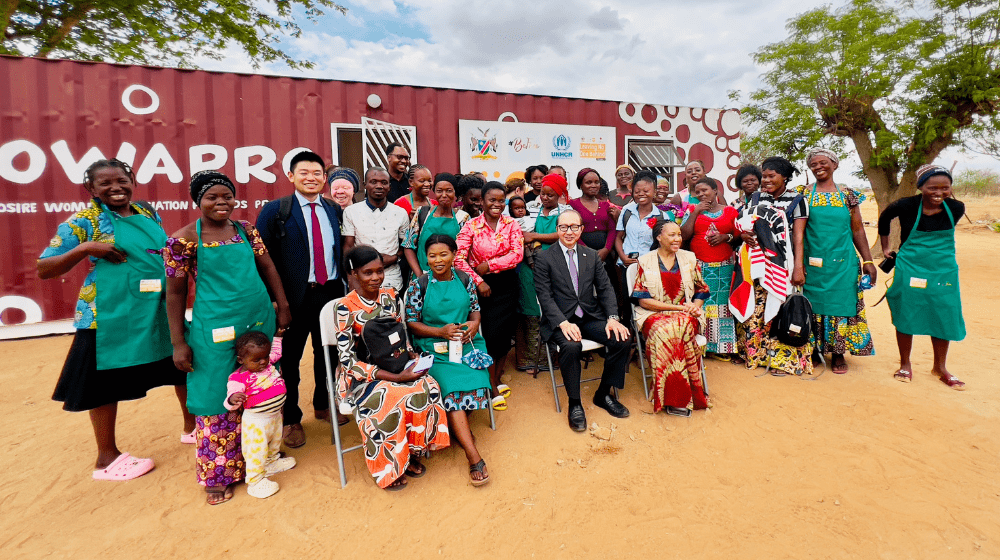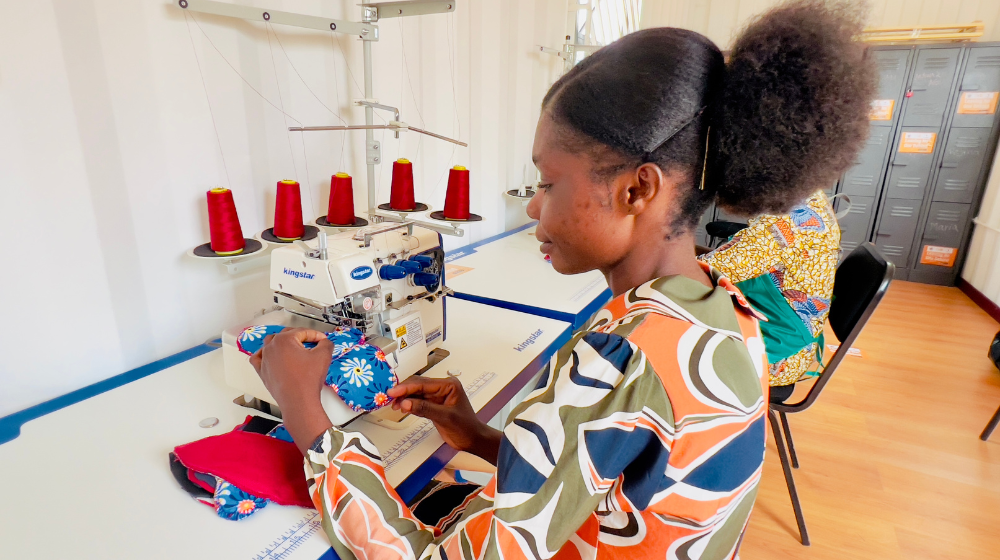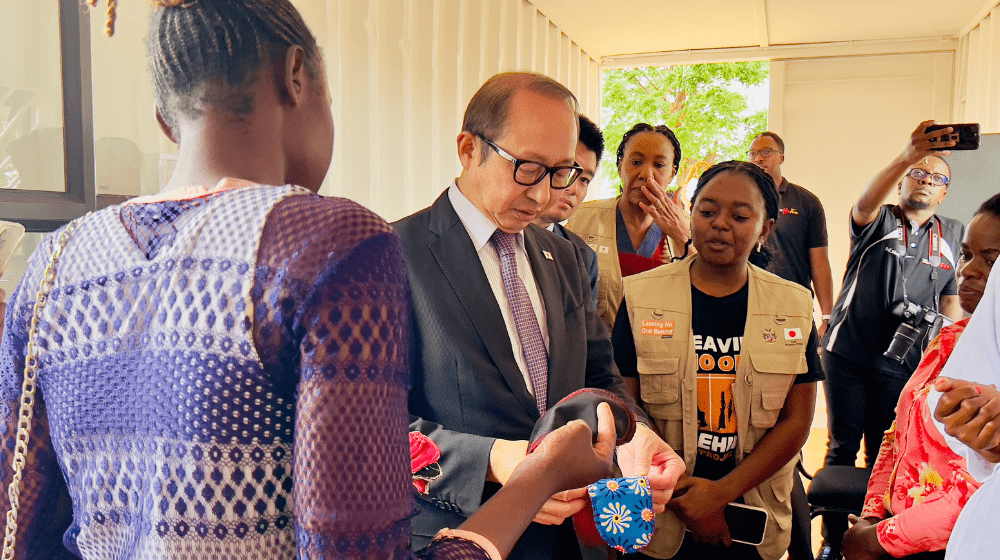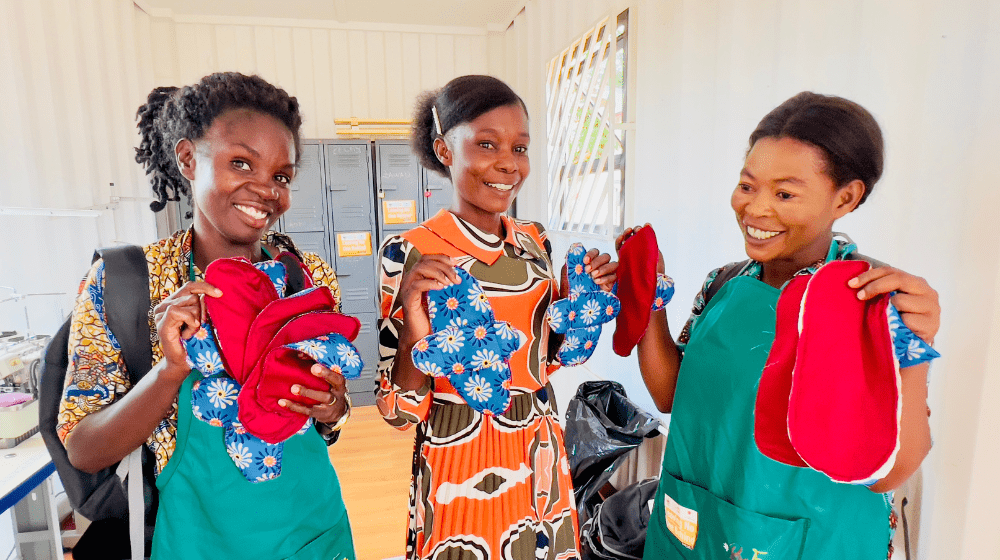
OSIRE, Namibia – At the Osire Refugee Settlement in Namibia, three women – Noela Omba (31), Esther Kisera (31) and Rebecca Kanjiliji (32) – are beginning to change the narrative of their lives and their community through the Sanitary Pad-Making Initiative. This initiative, launched in July 2024, seeks to equip marginalized women with essential skills to produce reusable sanitary pads. The goal is to promote menstrual hygiene, improve economic opportunities, and empower these women to take charge of their futures.
Before this, I never imagined I could make my own pads, let alone sell them.
For Noela, Esther, and Rebecca, who all fled violence in their home countries and sought refuge at Osire, the initiative represents hope and dignity. "Before this, I never imagined I could make my own pads, let alone sell them," said Noela, smiling as she worked on her sewing machine. “It feels like we are taking control of something that has always been a challenge for women like us.”
The initiative, which started with training for 30 women, focuses on menstrual hygiene management and has created a core group of 10 women who now manufacture reusable sanitary pads. These pads are a sustainable alternative to disposable ones, offering an affordable and reusable solution to the women and girls living at the settlement, as well as to the surrounding communities.
"Many people cannot afford sanitary pads, making this initiative a vital resource for those lacking the financial means," said Esther. "The ability to reuse these pads is something I will always appreciate and I am excited that we can also offer them to others in the community who need them.”

Skills for sustainability and empowerment
The initiative is part of the UNFPA Namibia “Leaving No One Behind (LNOB) - Building Back Better from COVID-19,” which aims to restore dignity to women and girls, while also addressing gender-based violence (GBV) and the negative impacts on sexual and reproductive health (SRH) caused by the pandemic. Funded by the Embassy of Japan in Namibia and implemented by One Economy Foundation with support from the United Nations High Commissioner for Refugees, the Ministry of Home Affairs, Immigration, Safety and Security, and the Society for Family Health Namibia, the initiative is transforming lives at Osire.
The objectives of the initiative are simple yet compelling
- Equip 30 women at Osire with the skills to produce reusable sanitary pads, fostering self-sufficiency and economic independence.
- Provide industrial sewing machines and raw materials as part of the starter kits.
- Improve menstrual hygiene management among women and girls by offering a sustainable alternative to disposable pads.
- Ensure access to sanitary products, which are vital for health and dignity, to both women and girls in the settlement and the surrounding communities.
The settlement itself, established in 1992, has been home to thousands of refugees fleeing conflict in Angola, Burundi, the Democratic Republic of the Congo, Rwanda, and Somalia. Today, the settlement is home to nearly 7,000 residents, with a fairly balanced gender ratio.

Japanese Ambassador visits Osire Refugee Settlement
On 8 November 2024, the Japanese Ambassador to Namibia, H.E. Mr. Hisao Nishimaki, visited the Osire Refugee Settlement to witness firsthand the progress of the Sanitary Pad-Making Initiative. He expressed his support for the initiative, highlighting Japan’s commitment to empowering women and girls globally.
We believe that by supporting the empowerment of women in the settlement , we can help break the cycle of poverty and improve the lives of entire communities.
“This initiative aligns with Japan's vision of promoting gender equality and sustainable development,” Ambassador Nishimaki remarked during his visit. “We believe that by supporting the empowerment of women in the settlement , we can help break the cycle of poverty and improve the lives of entire communities.”
The Sanitary Pad-Making Initiative has already begun to show tangible results. Women at Osire now have access to reusable sanitary pads, which not only help them manage menstrual hygiene but also provide a potential source of income. The pads are made for personal use and can be sold outside the settlement , generating economic opportunities for the women involved and meeting the needs of the wider community.
This initiative has changed everything for me. Not only am I learning new skills, but I’m also able to help others in my community.
Rebecca, another participant, shared how the initiative has impacted her life: “This initiative has changed everything for me. Not only am I learning new skills, but I’m also able to help others in my community. The pads we make are something that women truly need, and we now have the chance to make a difference not only in our lives but in the lives of many others.”
As the women of Osire continue to sew and learn, their story is one of resilience and empowerment. Through the Sanitary Pad-Making Initiative, they are not only gaining new skills but also a renewed sense of hope for the future – one stitch at a time.


